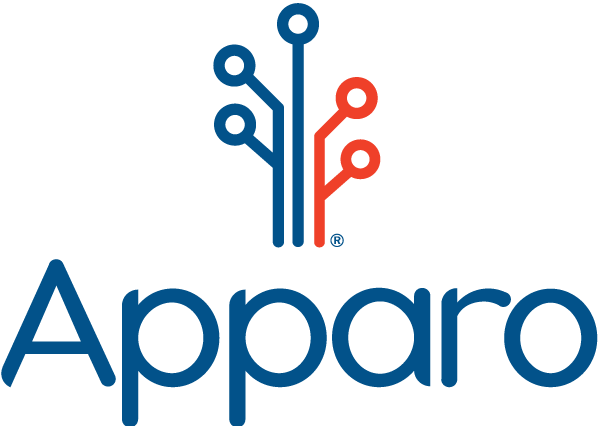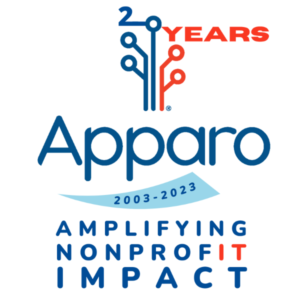Matthews Help Center (MHC) reached out to Apparo for data tracking and reporting support in 2016. The impact on their ability to serve has been significant.

MHC had recently gotten Salesforce, but found implementation to be a challenge. Apparo matched them to Centric Consulting, who volunteered with them on two Community Impact Projects (CIP) to implement a donor and client database to replace their use of FileMakerPro in combination with Microsoft Excel. These projects were generously sponsored by Piedmont Natural Gas and Dell-EMC.
Two years after the completion of their second CIP with Centric Consulting, we checked in with Sandra Conway (Executive Director), Kelly Trott (Social Work Manager) and Erica Bermudez (Social Worker) of MHC. They helped us understand the challenges they faced before working with Apparo and the improvements ever since.
BEFORE WORKING WITH CENTRIC CONSULTING AND APPARO
Limited data tracking capabilities cost MHC staff 15+ work days each month in time spent double–entering and double–checking data. This time came at the expense of client service.
“We were unable to meaningfully track our data,” explains Kelly. “We built a process where we entered all of our notes and some of our data in FileMakerPro and then recorded all of the additional client data we needed to track into Excel. Then we had to spend more time to make sure the data matched. Every time a social worker met with a client, we would need 30 minutes to an hour for data entry, then we had to put time aside for data clean up. One Friday night it took me 5 hours to find the one small error that was making the data not match. This time added up to the equivalent of 3-4 days in each month for 5 staff members and limited the number of clients we could see in a day.”
Maintaining their reporting requirements forced MHC to hire 3 additional staff members.
Erica describes their extremely cumbersome report generation process. “We couldn’t export reports, so we had to screenshot everything. We couldn’t sort or filter results or search for any specific information. We had to look through the screenshots and search for the data we needed.”
“It took 2 and a half weeks of my time to put together the Board report from screenshots and Excel, every month,” shares Kelly. “Because of this demand on my time, for a year and a half, we had to hire 2 additional full time social worker to serve our clients.”
Erica explains that “the first year of the Leon Levine grant it took two weeks for us to collect the outcome information we needed. We had to go into each client record individually and scroll through one long running tab of every service that had ever been provided and read through the notes to categorize the crisis.”
Kelly describes yet another reporting burden: “At the end of every fiscal year we had to compile the data to create our annual report. This process took pretty much all of Erica’s and my time for the whole month of July. I spent lots of nights and weekends working on this, too. We had to hire another full time person in June to support this data effort.”
Erica explains how this timing is especially troubling. “The summertime months are our highest need because of additional childcare and utilities expenses. They really needed us and we were compiling data.”
Missing/incomplete data also negatively impacted client service.
Kelly explains that client data was often lost because “sometimes we would get kicked out of the system and lose our work. In social work, it’s key to have background information because it informs how you move forward with a client.”
However, even properly saved data did not comprehensively cover their client service needs. For example, explains Erica, “We did not have the ability to track all of the resource recommendations we had made to our clients, the places we suggested they look for support. So we sometimes recommending the same resource again. It really negatively impacts your relationship with a client if you don’t have a full picture of what’s been going on. Missing data makes you look unprofessional.”
MHC was limited in their ability to apply for grants.
“There were a lot of grants that we just couldn’t apply for because we couldn’t get the information they needed,” explains Sandra. “Leon Levine passed us up the first year we applied because of missing data. We collected the information, but it was just too time consuming to extract.”
With data tracking and reporting burdens hanging over their heads, MHC social workers were low on job satisfaction.
Erica sums it up, “The social worker job was just not fulfilling.”
TODAY
After working with Apparo and Centric to implement Salesforce, they now have the ability to accurately and efficiently track and access the data they need to manage and enhance their client service.
“Now we can quickly log all of the information we need for client management and easily access it,” explains Kelly. “I can now provide deeper impact. I can spend more time with each client and feel refreshed and ready for the next client. This is a challenging field. Not having to worry about the data and reporting makes me a better social worker and our clients get better service.”
Kelly describes another Salesforce-enabled benefit to their clients for receiving needed groceries and thrift shop items. “Our clients now have the ability to let their social worker know what they want from the food pantry during a meeting. Pantry volunteers can immediately see and fill the order, so it is ready whenever they are ready to leave. Social workers can now also also print gift certificates for them to shop at our store.”
Reporting is now accurate, comprehensive and fast, eliminating the need for the additional staff members and improving the grant application process.
Kelly explains that “the report that took 2.5 weeks to compile, now takes 10 minutes and it’s even more insightful because we can track unique client served and other data that we could not before. We are better at showing our impact. These projects have given me 2 and a half more weeks of client service time every month. Now I can see 2-3 more clients per day and see them every week of the month, year-round.”
Sandra adds, “Grantors are very excited to see our new impact numbers and they continue to support us over time, which is not always a given.”
“I feel confident that if another grant comes along, we’ll be able to apply,” Kelly says.
MHC now has the data analytics capabilities and database skills needed to shape the future of their organization as they adapt to changing client needs.
Kelly explains, we can better understand our clients overall and as we move forward as an agency, we can adapt to that.”
Sandra adds, “This information is so helpful in us understanding who are we. It will guide what we want to do going forward.”
As they add new programs and metrics, they can be confident that they can customize Salesforce as needed for new tracking needs.
With the new ability to work from home from the cloud, added time to dedicate to client service, and an internal peer to provide tech support, job satisfaction is up.
Erica explains how she gained her Salesforce knowledge through her CIP Corporate volunteer and Apparo’s support. “Although it would have probably been quicker and easier to simply do it himself, TJ took the time to show me how to update the database to adapt to the changing needs of our nonprofit. Our Apparo project managers’ diligent note taking and help was key in keeping us on task and focused on creating something that we could really use.”
“I’m happier. I’m a professional social worker. I’m here to serve our community,” reflects Kelly. “The partnership with Apparo is invaluable. We really needed to find a partner we could trust. Apparo paired us with Centric and it was such an amazing relationship. We have two Board members from Centric now. We walked away with so much more than we thought we were going to get at the beginning,” Kelly reflects.


